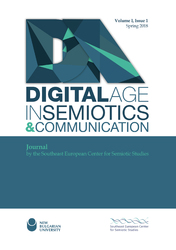The effeteness of Social media
The effeteness of Social media
Author(s): Reni YankovaSubject(s): Philosophy, Social Sciences, Education, Fine Arts / Performing Arts, Visual Arts, Semiology, Higher Education
Published by: Нов български университет
Keywords: Effete mind; Habit; Social media; Peirce; Knowledge
Summary/Abstract: Social media are a new phenomenon attracting the interest of researchers from different fields–marketing experts, sociologists, anthropologists, even philosophers and semioticians. The problems related to them vary and many remain unanswered. The current paper analyzes the level of social media habituation, taking Charles Peirce`s evolutionary cosmology, and more specifically the concept of effete mind, as its milestones. Other important studies considered here are from the fields of anthropology and media studies. Communication and the transfer of information have always been vital for living creatures, not only humans but animals, plants and even microorganisms. During the centuries of our existence and evolution we have developed complicated sign systems to satisfy the need for knowledge transfer among the members of our social groups. In the digital era many questions about the new forms of communication arise. Here I will analyze one of them: are these new media something totally new or do they follow some kind of universal tendency and predisposition? To answer this question I will consider Charles Peirce`s ideas of habit and habit-taking tendency, his concepts of living and effete mind, together with the studies of Robin Dunbar and Tom Standage. In his book Writing on the wall. Social media–the first 2, 000 years (2013) Standage examines the question of writing on the walls as one of the oldest methods of communication and knowledge transfer. It dates back to the age of cavemen, long before any of societyЎЇs modern tools were even considered possible. Over the centuries these methods evolved and became more sophisticated but it kept their essence and main function–to transfer information for the well-being of the group and its members. Centuries ago at the dawn of human kind, the necessity of survival shaped our predisposition for communication. Since then, the tools have changed but the necessity and the reasons for it remain the same. As such, the current state of well-developed digital social media could be considered a manifestation of the Peircean concept of habit-taking tendency, combined with human natural need of communication and information sharing stated by Standage and also by the evolutionary anthropologist Robin Dunbar.
Journal: Digital Age in Semiotics & Communication
- Issue Year: I/2018
- Issue No: 1
- Page Range: 187-196
- Page Count: 10
- Language: English

